Dementia Researcher Blogs
The Dementia Researcher Blogs Podcasts - through this show, you can hear our bloggers read their blogs. So if you prefer to read, you can head or our website or you can listen on the move. These shows are about academic / research careers, research, science and life as an early career dementia researchers. Brought to you by https://www.dementiaresearcher.nihr.ac.uk - everything you need, all in one place. Remember to subscribe to our main ‘Dementia Researcher‘ Podcast, here and where ever you get your podcasts.
The Dementia Researcher Blogs Podcasts - through this show, you can hear our bloggers read their blogs. So if you prefer to read, you can head or our website or you can listen on the move. These shows are about academic / research careers, research, science and life as an early career dementia researchers. Brought to you by https://www.dementiaresearcher.nihr.ac.uk - everything you need, all in one place. Remember to subscribe to our main ‘Dementia Researcher‘ Podcast, here and where ever you get your podcasts.
Episodes
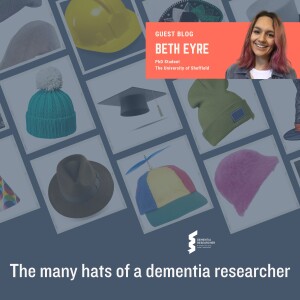
Tuesday May 16, 2023
Beth Eyre - The many hats of a dementia researcher
Tuesday May 16, 2023
Tuesday May 16, 2023
Beth Eyre narrates her blog written for Dementia Researcher.
Join Beth on an exciting journey through the various hats worn by researchers in this blog. If you're curious about the hidden aspects of a PhD journey and want to gain insights into the diverse roles researchers play, this blog is a must-read! Beth shares her personal experiences and lessons learned, unraveling the intricacies of designing projects, conducting experiments, analyzing data, and more. Whether you're a budding researcher or simply fascinated by the world of academia, this blog will expand your understanding of the multifaceted nature of research.
Find the original text, and narration here on our website.
https://www.dementiaresearcher.nihr.ac.uk/guest-blog-the-many-hats-of-a-dementia-researcher/
--
Beth Eyre is a PhD Student at The University of Sheffield, researching Neurovascular and cognitive function in preclinical models of Alzheimer’s disease. Beth has a background in psychology, where she gained her degree from the University of Leeds. Inside and outside the lab, Beth loves sharing her science and in her blogs she discusses her work, career and shares lessons she learns as she navigates life as an early career researcher.
--
This podcast is brought to you in association with Alzheimer's Association, Alzheimer's Research UK, Alzheimer's Society and Race Against Dementia, who we thank for their ongoing support. Enjoy listening? We're always on the look out for new contributors, if you would like to write and narrate your own blog - drop us a line dementiaresearcher@ucl.ac.uk.
Don't forget to also listen to our fortnightly podcast, just look for Dementia Researcher in your podcast app.

Friday May 12, 2023
Friday May 12, 2023
Hannah Hussain narrates her blog written for Dementia Researcher.
Looking to improve your health as you age? Hannah suggests you look no further than resistance training! As our bodies naturally experience a decline in muscle mass, strength, and function, it's important to combat sarcopenia with exercise. And lifting weights has been shown to not only slow or reverse the effects of sarcopenia but also improve bone density, cardiovascular health, cognitive function, and mood. Plus, it's especially beneficial for people with dementia. Don't let aging slow you down - Hannah makes the case for incorporate resistance training into your exercise routine and enjoy a healthier, happier life!
Find the original text, and narration here on our website.
https://www.dementiaresearcher.nihr.ac.uk/guest-blog-weightlifting-is-only-for-your-younger-years-right-wrong/
--
Hannah Hussain is a PhD Student in Health Economics at The University of Sheffield. As a proud third generation migrant and British-Asian, her career path has been linear and ever evolving, originally qualifying as a Pharmacist in Nottingham, then Health Economics in Birmingham. Her studies have opened a world into Psychology, Mental Health and other areas of health, and with that and personal influences she found her passion for dementia.
--
This podcast is brought to you in association with Alzheimer's Association, Alzheimer's Research UK, Alzheimer's Society and Race Against Dementia, who we thank for their ongoing support.
Enjoy listening? We're always looking for new bloggers, drop us a line dementiaresearcher@ucl.ac.uk

Thursday May 11, 2023
Dr Yvonne Couch - Developing a Plan B
Thursday May 11, 2023
Thursday May 11, 2023
Dr Yvonne Couch, narrates her blog written for the Dementia Researcher website.
In this blog Yvonne talks about developing a Plan B for your career (just in case, because we all know that "No plan survives first contact with the enemy"). Yvonne works through unlocking your potential and exploring new career paths - leverage your skills, embrace change, and create opportunities beyond academia. Don't settle for unhappiness—make a choice for your future and find success.
Find the original text, and narration here on our website.
https://www.dementiaresearcher.nihr.ac.uk/guest-blog-developing-a-plan-b/
--
Dr Yvonne Couch is an Alzheimer's Research UK Fellow at the University of Oxford. Yvonne studies the role of extracellular vesicles and their role in changing the function of the vasculature after stroke, aiming to discover why the prevalence of dementia after stroke is three times higher than the average. It is her passion for problem solving and love of science that drives her, in advancing our knowledge of disease. Yvonne writes about her work, academic life, and careers as she takes a new road into independent research @dr_yvonne_couch
--
Enjoy listening? We're always looking for new bloggers, drop us a line. http://www.dementiaresearcher.nihr.ac.uk
This podcast is brought to you in association with Alzheimer's Association, Alzheimer's Research UK, Alzheimer's Society and Race Against Dementia, who we thank for their ongoing support.
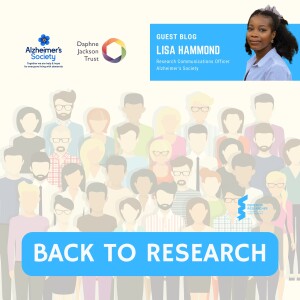
Tuesday May 09, 2023
Lisa Hammond - Back to Research
Tuesday May 09, 2023
Tuesday May 09, 2023
Lisa Hammond narrates her blog written for Dementia Researcher.
Welcome to our first blog from Lisa Hammond, in this post she delves into the transformative work of the Daphne Jackson Trust and the Alzheimer's Society, shedding light on the significance of supporting individuals in returning to careers in dementia research. This inspiring journey explores how these organizations play a pivotal role in empowering individuals who temporarily stepped away from their professional lives to care for loved ones or start families.
Caring for someone with dementia or dedicating time to family responsibilities is a noble and selfless act. However, for those who aspired to contribute to the field of dementia research, these detours often meant putting their own ambitions on hold. Recognizing the immense potential and untapped talent that lay dormant, the Daphne Jackson Trust, has emerged as a beacon of hope for those seeking to reignite their careers in the realm of dementia research.
Find the original text, and narration here on our website.
https://www.dementiaresearcher.nihr.ac.uk/guest-blog-back-to-research/
--
Lisa Hammond is a Research Communications Officers at Alzheimer’s Society. As part her my role, she shares and communicates the pioneering research that Alzheimer's Society are funding. Lisa has a background in neuroscience and fine art which allows helps her to xplain science in an out of the box way. Outside work Lisa is a keen gardener, and she enjoys nature and anything creative.
--
Enjoy listening? We're always looking for new bloggers, drop us a line. http://www.dementiaresearcher.nihr.ac.uk
This podcast is brought to you in association with Alzheimer's Association, Alzheimer's Research UK, Alzheimer's Society and Race Against Dementia, who we thank for their ongoing support.
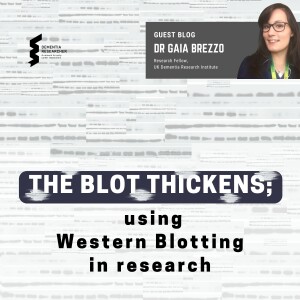
Friday May 05, 2023
Dr Gaia Brezzo - The Blot thickens; using Western Blotting in research
Friday May 05, 2023
Friday May 05, 2023
Dr Gaia Brezzo narrates her blog written for Dementia Researcher.
Are you tired of the witchcraft and frustration of Western Blotting? Learn the basics of this technique and how it can benefit your research in this new blog from Gaia. Find out how to select the right sample, run a successful gel electrophoresis, transfer proteins, and quantify the results. Discover tips and tricks from a researcher who's been there. Don't let Western Blotting intimidate you anymore, read our blog now!"
Find the original text, and narration here on our website.
https://www.dementiaresearcher.nihr.ac.uk/guest-blog-the-blot-thickens-using-western-blotting-in-research/
--
Dr Gaia Brezzo is a Research Fellow based within the UK Dementia Research Institute at The University of Edinburgh. Gaia's research focuses on understanding how immune alterations triggered by stroke shape chronic maladaptive neuroimmune responses that lead to post-stroke cognitive decline and vascular dementia. Raised in Italy, Gaia came to the UK to complete her undergraduate degree, and thankfully, stuck around. Gaia writes about her work and career challenges, when not biking her way up and down hills in Edinburgh. Follow Gaia on Twitter: @Gaia_Brezzo
--
Enjoy listening? We're always looking for new bloggers, drop us a line. http://www.dementiaresearcher.nihr.ac.uk
This podcast is brought to you in association with Alzheimer's Association, Alzheimer's Research UK, Alzheimer's Society and Race Against Dementia, who we thank for their ongoing support.
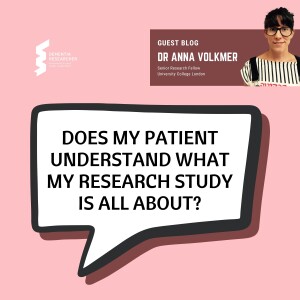
Thursday May 04, 2023
Dr Anna Volkmer - Does my patient understand what my research study is about?
Thursday May 04, 2023
Thursday May 04, 2023
Dr Anna Volkmer, narrates her blog written for Dementia Researcher.
The Mental Capacity Act 2005 is a legislation that aims to protect the rights of people who may lack capacity to make decisions. This Act provides guidance to professionals to decide whether someone has decision-making capacity. It also offers practical examples of how to judge if a person can understand, retain, weigh up, and express a decision. The Act also provides guidance to researchers on gaining consent from research participants. However, researchers often find this legislation and code of practice complicated and difficult to follow, which leads to people with communication difficulties being excluded from studies. In this blog Anna goes through the issues and makes suggestions on how to address the issues.
Find the original text, and narration here on our website.
https://www.dementiaresearcher.nihr.ac.uk/guest-blog-does-my-patient-understand-what-my-research-study-is-about/
--
Dr Anna Volkmer is a Speech and Language Therapist and researcher in Language and Cognition, Department of Psychology and Language Sciences, University College London. Anna is researching Speech and language therapy interventions in language led dementia and was once voted scariest speech and language therapist (even her children agree).
--
If you would like to write your own blog drop us a line, we're always on the look out for new contributors to write about their research, careers + more dementiaresearcher@ucl.ac.uk
--
This podcast is brought to you in association with Alzheimer's Association, Alzheimer's Research UK, Alzheimer's Society and Race Against Dementia, who we thank for their ongoing support.
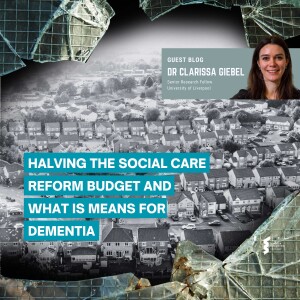
Tuesday May 02, 2023
Dr Clarissa Giebel- Halving Social Care Reform Budget, what it means to dementia
Tuesday May 02, 2023
Tuesday May 02, 2023
Dr Clarissa Giebel narrates her blog written for Dementia Researcher.
Recently, the UK Government announced that the originally planned £500m social care reform budget would be halved. That’s means £250m to be invested into a struggling social care sector, specifically the social care workforce. Now, £250m is a lot of money, but how far will that go to helping? Clarissa discusses what comes next.
Find the original text, and narration here on our website.
https://www.dementiaresearcher.nihr.ac.uk/guest-blog-halving-social-care-reform-budget-what-it-means-to-dementia/
--
Dr Clarissa Giebel is a Senior Research Fellow at the University of Liverpool and NIHR ARC North West Coast. Clarissa has been working in dementia care research for over 10 years focusing her research on helping people with dementia to live at home independently and well for longer, addressing inequalities that people with dementia and carers can face. Outside of her day work, Clarissa has also organised a local dementia network - the Liverpool Dementia & Ageing Research Forum, and has recently started her own podcast called the Ageing Scientist.
--
If you would like to write your own blog drop us a line, we're always on the look out for new contributors to write about their research, careers + more dementiaresearcher@ucl.ac.uk
This podcast is brought to you in association with Alzheimer's Association, Alzheimer's Research UK, Alzheimer's Society and Race Against Dementia, who we thank for their ongoing support.
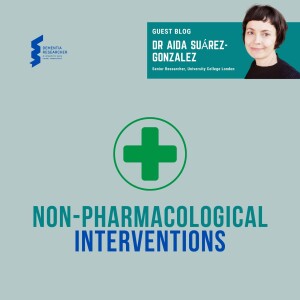
Thursday Apr 27, 2023
Dr Aida Suarez-Gonzalez - Non-pharmacological interventions: methods matter
Thursday Apr 27, 2023
Thursday Apr 27, 2023
Dr Aida Suárez-Gonzalez narrates her blog written for Dementia Researcher.
In this blog Aida shares valuable tips for researchers who are planning to undertake research on non-pharmacological interventions in dementia. From identifying the right intervention to selecting appropriate outcome measures, and provide practical advice to help you design high-quality studies, that are deliverable and that can have a meaningful impact on the lives of people with dementia. Join us as we explore the unique challenges and opportunities in this exciting area of research.
Find the original text, and narration here on our website.
https://www.dementiaresearcher.nihr.ac.uk/guest-blog-non-pharmacological-interventions/
--
Dr Aida Suarez-Gonzalez is a Clinical Neuropsychologist and Senior Research Fellow at the Dementia Research Centre, UCL Institute of Neurology at Queen Square. With many years clinical experience working in Spain, Aida now investigating non-pharmacological interventions, services and assistive technologies to support people living well with dementia.
--
This podcast is brought to you in association with Alzheimer's Association, Alzheimer's Research UK, Alzheimer's Society and Race Against Dementia, who we thank for their ongoing support. Enjoy listening? We're always looking for new bloggers, drop us a line dementiaresearcher@ucl.ac.uk
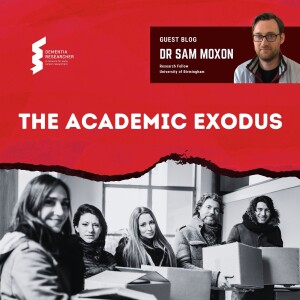
Tuesday Apr 25, 2023
Dr Sam Moxon - The Academic Exodus
Tuesday Apr 25, 2023
Tuesday Apr 25, 2023
Dr Sam Moxon, narrates his blog written for Dementia Researcher.
In this blog Sam explores the leaky careers pipeline in academia. For many aspiring academics, the path seems clear: get a PhD, publish research, and secure a tenure-track position. However, the reality is far more complex, and many talented scholars find themselves struggling to make ends meet in an increasingly competitive and precarious job market - so they leave. Anecodtally, we're hearing PIs tell us that 3 years ago they might get 50-60 applications for a 4 year postdoc job, and today... they're getting 5-10 (so maybe good for some, but bad for others). In this blog, Sam talks about the challenges facing early-career scholars why people might be leaving, where they're going and what this might mean for the future,
Find the original text, and narration here on our website.
https://www.dementiaresearcher.nihr.ac.uk/guest-blog-the-academic-exodus/
--
Dr Sam Moxon is a biomaterials Research Fellow at University of Birmingham. His expertise falls on the interface between biology and engineering. His PhD focussed on regenerative medicine and he now works on trying to develop 3D bioprinting techniques with human stem cells, so that we better understand and treat degenerative diseases. Outside of the lab he hikes through the Lake District and is an expert on all things Disney.
Enjoy listening and reading our blogs? We're always on the look out for new contributors, drop us a line and share your own research and careers advice dementiaresearcher@ucl.ac.uk
This podcast is brought to you in association with Alzheimer's Association, Alzheimer's Research UK, Alzheimer's Society and Race Against Dementia, who we thank for their ongoing support.





